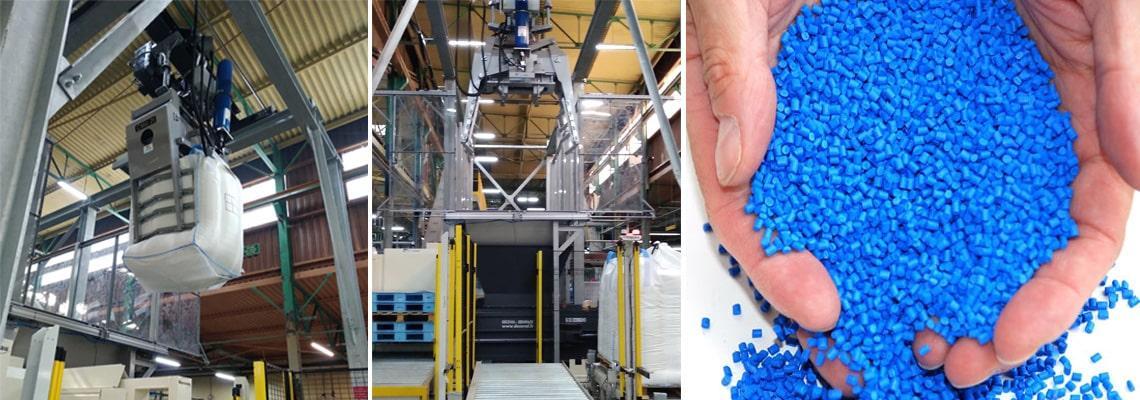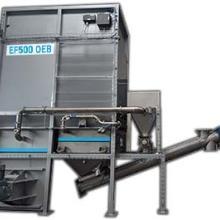High rate bulk bag unloading system for the plastics and polymer industry
Processed Materials: PET resin pellets and PET flake
Objective: Our client, located in South Carolina, USA, is a global supplier of flooring products, including: synthetic turf, stone, tile, laminate, hardwood and carpet.
They looked to Palamatic Process to help with project research and process design to help solve an ongoing issue with shortages in the labor market. The goal was to deliver an automated system to unload bulk bags of PET materials, with minimal operator intervention. Because PET flake can have a relatively lighter bulk density, the super sacks were outside the standard specifications resulting in taller and less stable FIBCs. The challenge was then to create a method for loading bulk bags of largely varying sizes into the powder discharging system. The system also required a turnkey solution for methods involving waste disposal of the empty bulk bags as well as material transfer equipment to convey the pellets and flakes to the client’s downstream process.
The Solution: Our team spent many hours designing and creating an automated bulk bag filling system that would perform the following functions: bulk bag transfer, bulk bag lifting and emptying, waste disposal and compaction and material conveying. By designing all required functions for emptying bulk bags into one system, the client could run production uninterrupted despite an unpredictable labor resource pool.
The Equipment:
- Easyflow® EF500 Automated Flexible Intermediate Bulk Container Unloading System
- Tubular Screw Conveyor
- Controls and Automation
1. Easyflow® EF500 Automated Flexible Intermediate Bulk Container Unloading System
The Palamatic Process Easyflow® line of super sack discharging equipment encompasses material handling solutions from manual, semi-automated, and fully automated system processes. The EF500 model takes all need for operator intervention out of the equation. All that is required is that operators 1) load bulk bags onto the mechanical roller conveyors, 2) empty the bulk bag compactor, 3) empty the pallet stacker and 4) perform usual maintenance requirements.
Central to the EF500 super sack emptying system is the hydraulic gripper crane. The bulk bag gripper allows the automatic operation of grabbing, lifting, transferring, opening and removal of the bulk bag to be discharged. It is designed with a two-stage gripping action. The main gripper consists of a robust steel structure with bars for squeezing the sides of the bulk bag to carry the majority of the weight. The secondary grippers are at the top of the claw-like structure, responibile for pinching the top of the bulk bag fabric and handles. When the gripper transfers the bulk bag over the material discharge hopper, it lowers it onto a burst spike which splits the bulk bag open. The contents pour out and the secondary grippers hold onto the top of the FIBC as it deflates. Once fully empty, the bulk bag crane then moves it to a hopper for removal and compaction. It is designed ot handle a maxium load of 1.2 metric tons, but can be designed to handel more if called for. Other custom features included an extendable gripper for larger and taller bulk bags.
Another integrated feature is the motorized roller conveyors. A forklift operator places the bulk bag on the mechanical conveyor where it is then moved to a staging area to be picked up and transferred by the gripper crane. Once the gripper removes the bulk bag, the empty pallet which it was resting on is then transferred to an automatic pallet stacking machine. The pallet stacker is designed to hold anywhere from 15 to 20 pallets, or about an hour and a half of operation time.
The puncture blade that is responsible for the automatic cutting and opening of the bulk bag is a three-sided squared off serrated blade with burst spikes. When the weight of the bulk bag is placed on the blades, it is cut creating a flap-like opening. The contents then pour out into the buffer hopper waiting to be transferred. After the bulk bag is empty, it is dropped into a secondary hopper that feeds into a bulk bag compactor. The unit consists of a u-shaped housing with a larger auger at the bottom of the trough. The empty super sacks are pushed down a compaction tube which is fitted with a poly-sleeve. As bulk bags build inside the compaction chamber, they push the plastic sleeve outwards. As the sleeve grows, the operator simply twists, zip ties and cuts to remove the fully contained waste bags for disposal. The bulk bag compactor is capable of compressing 7 bulk bags per meter of sleeve.
2. Tubular Screw Conveyor
Another feature of this system is the mechanical auger conveyors, or screw conveyors, responsible for the powder transfer to the downstream production process. This type of powder conveying equipment is excellent for both the transfer or and controlled metering of bulk solids and dry materials. The inlet is bolted to the bottom flange of the hopper and consists of a direct drive motor attached to a tubular housing. Inside the tube is an auger with spiral flights which cause the forward momentum of the flakes and pellets. It is designed to handle a throughput rate of 10-12 bulk bags per hour, or roughly 10-12 tons per hour. The length between the inlet and outlet is approximately 10 feet with a tube diameter of 12”. Screw conveyors are great for continuous powder feeding applications with their robust design that allows them to work with light, medium or heavy-duty industrial applications.
3. Controls and Automation
The PLC was designed by our inhouse automation and electrical team. The control cabinet was made of an epoxy coated mild steel with a 7” touch screen. The PLC type is a Siemens S7-1500SP with Profinet communication.
The system was responsible for the management of the following operation cycles:
- Automatic management of the bulk bag conveyor system (storage and advancement).
- Automatic selection of the bulk bag material type to dedicated hopper and conveyor line.
- Automatic transfer of the loaded bulk bag by the hydraulic gripper mounted on a motorized trolley.
- Automatic bulk bag opening and emptying over buffer hopper.
- The containment doors of the EasyFlow® EF500 Bulk Bag Discharging Station enclosure open and close automatically to ensure maximum dust containment during the emptying cycle.
- Pressure management of the of the hydraulic clamp during the bulk bag discharging phase.
- Automatic feed + release of the bulk bag into the bulk bag compactor.
- Management of the empty pallet: automatic transfer to a pallet stacker.
- Automated gripper returns to original position for the next bulk bag.
Palamatic Process also offers remote diagnostic capabilities by integrating an ethernet remote maintenance box. This allows our team to remotely diagnose and troubleshoot any system errors or malfunctions in real time. Palamatic Process designs, assembles and programs all controls panels in-house. Our automation engineers include user friendly raw material inputs, lot traceability, operator identification and dosing reliability. The PLC handles and controls the bulk bag filling, pallet stacking, conveying, and hopper selection. Our technicians are also available for on-site commissioning and training support.
Palamatic Process has been supplying the powder and bulk solids industry with bulk bag handling equipment since 1992. In order to determine what solution is best for your project, contact one of our sales engineers. Together, our team of experts can provide the right kind of powder filling equipment that will meet your production goals.
Contact one of our experts today for assistance with needed material handling solutions and to request a quote.



















